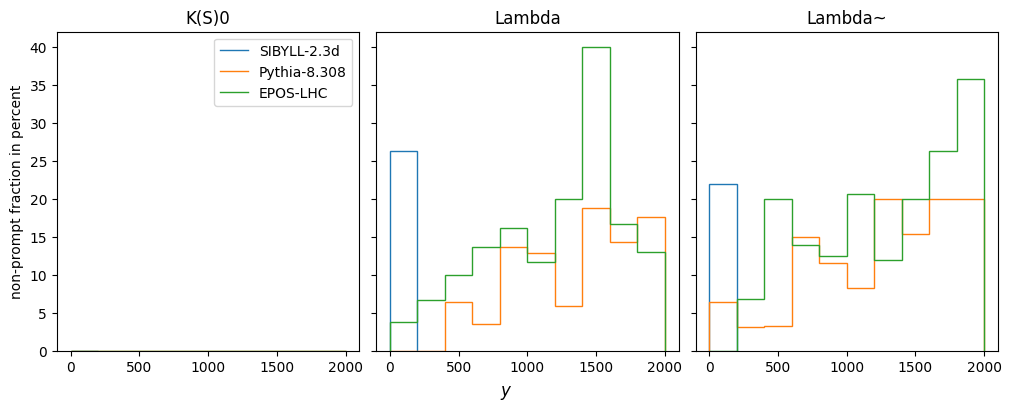import matplotlib.pyplot as plt
import boost_histogram as bh
from tqdm import tqdm
from particle import literals as lp, Particle
import joblib # only joblib works reliably in notebooks
import numpy as np
from chromo.kinematics import CenterOfMass, TeV, MeV, GeV
from chromo.constants import long_lived
import chromo.models as im
from chromo.util import pdg2name
import numba as nb
import gzip
import pickle
from pathlib import PathA particle is prompt, if it does not have particles in its decay history with life-times larger than 30 ps. According to this definition, some Lambda particles are not prompt, since a fraction of Xi and Omega decays produce Lambda particles, and Xi and Omega particles have life-times larger than 30 ps. We compute the fraction of KS and Lambda particles that are non-prompt. For the KS, we do not find any, but for Lambdas the feed-down is quite large.
We select KS and Lambdas only if they decay into two pions or one pions and one protons, respectively, and if those daughter particles are in the LHCb acceptance 2 < η < 5 and \(p > 2\)GeV/c. Since the LHCb acceptance also implicitly places a cut on the position of the decay vertex of the KS or Lambda, we also record it.
# The event kinematics objects defines the collision and its frame.
ekin = CenterOfMass(
2 * 6.8 * TeV,
"proton",
"proton"
)pid_axis = bh.axis.IntCategory([x.pdgid for x in (lp.K_S_0, lp.Lambda, lp.Lambda_bar)])
parent_axis = bh.axis.IntCategory([], growth=True)
pt_axis = bh.axis.Variable([150, 500, 650, 800, 1000, 1200, 2500])
y_axis = bh.axis.Regular(5, 2, 4.5)
z_axis = bh.axis.Regular(100, 0, 2000)
models = [
im.Sibyll23d,
im.Pythia8,
im.EposLHC
]
log_10_n_events = 6
@nb.njit
def select(pid, parents, eta, ptot, vz):
keep = (310, 3122, -3122)
keep_daughters = (211, 2212)
with_accepted_daughters = {}
decay_z = {}
for i, pidi in enumerate(pid):
if abs(pidi) not in keep_daughters:
continue
k = parents[i][0] - 1
if pid[k] not in keep:
continue
if 2 < eta[i] < 5 and ptot[i] > 2 * GeV:
if k not in with_accepted_daughters:
with_accepted_daughters[k] = 1
decay_z[k] = vz[i]
else:
with_accepted_daughters[k] += 1
r = np.zeros_like(pid, dtype="bool")
z = []
for k, n in with_accepted_daughters.items():
if n == 2:
r[k] = True
z.append(decay_z[k])
return r, np.array(z)
@nb.njit
def pid_of_parent(parents, pids, status):
r = np.zeros_like(pids)
for i, pa in enumerate(parents):
k = i
# we expect that history is not deeper than 100 ancestors
for _ in range(100):
k = parents[k][0] - 1
if k < 0 or status[k] == 4:
break
pid = pids[k]
if pid in long_lived and status[k] != 4:
r[i] = pid
break
else:
# should never happen
assert False
return r
@joblib.delayed
def run(Model):
m = Model(ekin, seed=1)
target = [lp.pi_0, lp.K_S_0, lp.Lambda]
target_mass = [p.mass for p in target]
# let long-lived particles decay which are heavier than the lightest target particle
for pid in long_lived:
mass = Particle.from_pdgid(pid).mass
if any(mass > m for m in target_mass):
m.set_stable(pid, False)
# let target particles decay
for p in target:
m.set_stable(p.pdgid, False)
h = bh.Histogram(y_axis, pt_axis, pid_axis, parent_axis, z_axis)
n_events = int(10 ** log_10_n_events)
with np.errstate(divide="ignore", invalid="ignore"):
for event in tqdm(m(n_events), total=n_events):
mother_pid = pid_of_parent(event.parents, event.pid, event.status)
mask, vz = select(event.pid, event.parents, event.eta, event.p_tot, event.vz)
event = event[mask]
mother_pid = mother_pid[mask]
h.fill(event.y, event.pt / MeV, event.pid, mother_pid, vz)
return m.label, h
fn = Path("feed_down_histograms.pkl.gz")
if not fn.exists():
with joblib.Parallel(n_jobs=10, batch_size=1) as pool:
results = pool(run(m) for m in models)
results = {label: h for (label, h) in results}
with gzip.open(fn, "w") as f:
pickle.dump(results, f)
else:
with gzip.open(fn) as f:
results = pickle.load(f)###################################################################
# EPOS LHC K. WERNER, T. PIEROG #
# Contact: tanguy.pierog@kit.edu #
###################################################################
# WARNING: This is a special retuned version !!! #
====================================================
| |
# Do not publish results without contacting the authors. #
| S I B Y L L 2.3d |
| |
| HADRONIC INTERACTION MONTE CARLO |
| BY |
| Eun-Joo AHN, Felix RIEHN |
| R. ENGEL, A. FEDYNITCH, R.S. FLETCHER, |
| T.K. GAISSER, P. LIPARI, T. STANEV |
| |
| Publication to be cited when using this program: |
| Eun-Joo AHN et al., Phys.Rev. D80 (2009) 094003 |
###################################################################
| F. RIEHN et al., hep-ph: 1912.03300 |
| last modifications: F. Riehn (05/20/2020) |
====================================================
read from /usr/local/lib/python3.11/site-packages/chromo/iamdata/epos/epos.iniev ...
read from /usr/local/lib/python3.11/site-packages/chromo/iamdata/epos/epos.initl ...
read from /usr/local/lib/python3.11/site-packages/chromo/iamdata/epos/epos.inirj.lhc ...
read from /usr/local/lib/python3.11/site-packages/chromo/iamdata/epos/epos.inics.lhc ...
Compute Cross-section (can take a while...)
*------------------------------------------------------------------------------------*
| |
| *------------------------------------------------------------------------------* |
| | | |
| | | |
| | PPP Y Y TTTTT H H III A Welcome to the Lund Monte Carlo! | |
| | P P Y Y T H H I A A This is PYTHIA version 8.308 | |
| | PPP Y T HHHHH I AAAAA Last date of change: 16 Nov 2022 | |
| | P Y T H H I A A | |
| | P Y T H H III A A Now is 05 Sep 2023 at 16:36:48 | |
| | | |
| | Program documentation and an archive of historic versions is found on: | |
| | | |
| | https://pythia.org/ | |
| | | |
| | PYTHIA is authored by a collaboration consisting of: | |
| | | |
| | Christian Bierlich, Nishita Desai, Leif Gellersen, Ilkka Helenius, Philip | |
| | Ilten, Leif Lonnblad, Stephen Mrenna, Stefan Prestel, Christian Preuss, | |
| | Torbjorn Sjostrand, Peter Skands, Marius Utheim and Rob Verheyen. | |
| | | |
| | The complete list of authors, including contact information and | |
| | affiliations, can be found on https://pythia.org/. | |
| | Problems or bugs should be reported on email at authors@pythia.org. | |
| | | |
| | The main program reference is C. Bierlich et al, | |
| | 'A comprehensive guide to the physics and usage of Pythia 8.3', | |
| | SciPost Phys. Codebases 8-r8.3 (2022) [arXiv:2203.11601 [hep-ph]] | |
| | | |
| | PYTHIA is released under the GNU General Public Licence version 2 or later.| |
| | Please respect the MCnet Guidelines for Event Generator Authors and Users. | |
| | | |
| | Disclaimer: this program comes without any guarantees. | |
| | Beware of errors and use common sense when interpreting results. | |
| | | |
| | Copyright (C) 2022 Torbjorn Sjostrand | |
| | | |
| | | |
| *------------------------------------------------------------------------------* |
| |
*------------------------------------------------------------------------------------*
SIG_AIR_INI: initializing target: (i,A) 1 0 air..
seedj: 2 0.2378239512329647-313
EPOS used with FUSION option
SIG_AIR_INI: initializing target: (i,A) 2 14 nit..
SIG_AIR_INI: initializing target: (i,A) 3 16 oxy.. 29%|██▉ | 288315/1000000 [03:02<06:51, 1730.64it/s]mothers = set()
for model, h in results.items():
for pid in h.axes[3]:
mothers.add(pid)
for model, h in results.items():
fig, ax = plt.subplots(1, 3, figsize=(10, 4), sharex=True, sharey=True)
val = h.project(2, 3).values()
plt.suptitle(model)
for i, pid in enumerate(h.axes[2]):
plt.sca(ax[i])
plt.title(pdg2name(pid))
v = np.zeros(len(mothers))
for pid2 in mothers:
try:
k = h.axes[3].index(pid2)
v[k] = val[i, k]
except KeyError:
pass
y = np.arange(len(v))
plt.barh(y, v)
plt.yticks(y, [pdg2name(pid) if pid != 0 else "prompt" for pid in mothers])
plt.xlim(0.5, None)
plt.semilogx();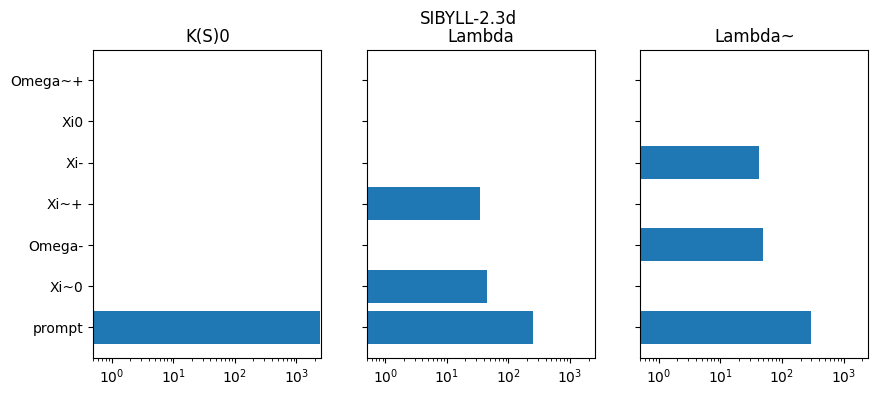
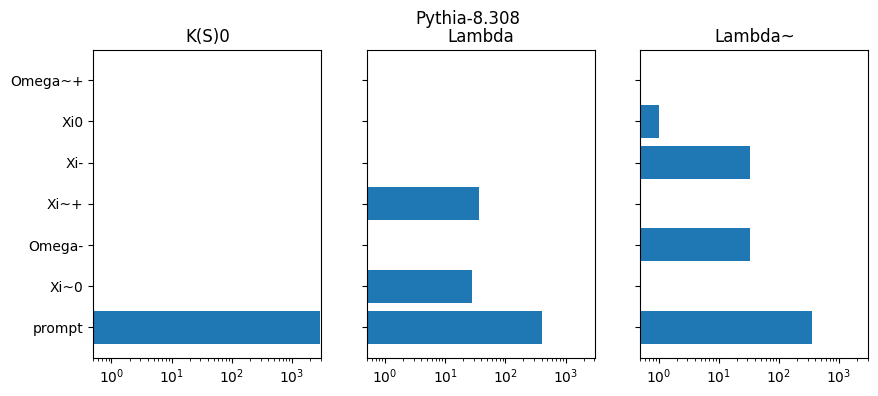
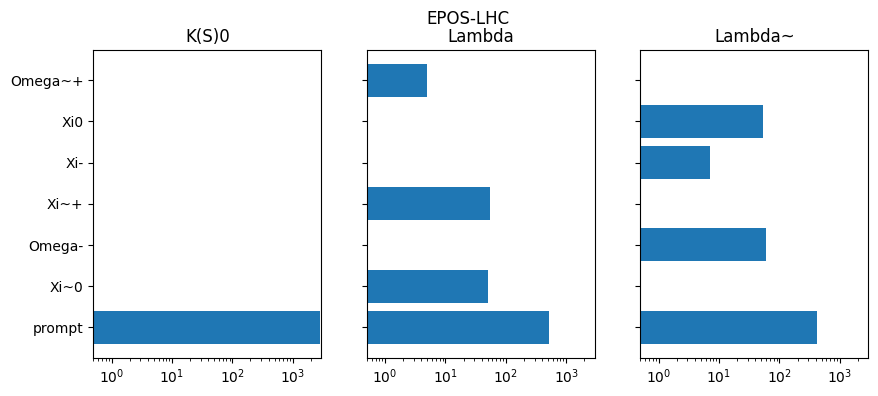
for model, h in results.items():
val = h.project(2, 4).values()
plt.figure()
plt.suptitle(model)
for i, pid in enumerate(h.axes[2]):
plt.stairs(val[i], h.axes[4].edges, label=pdg2name(pid))
plt.legend()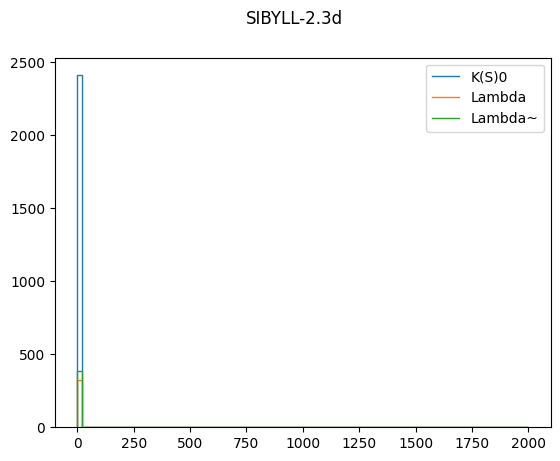
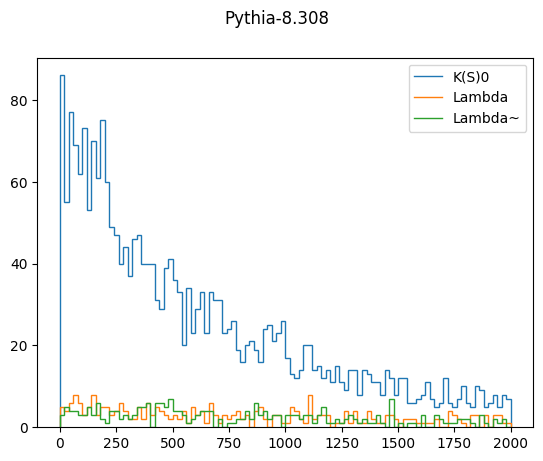
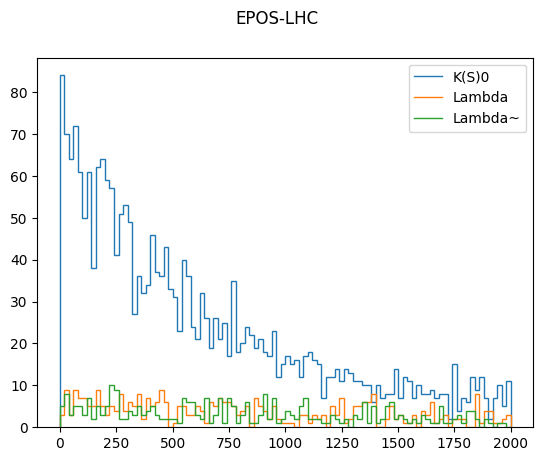
for model, h in results.items():
fig, ax = plt.subplots(1, 3, figsize=(10, 4),
sharex=True, sharey=True, layout="compressed")
plt.suptitle(model)
for i, pid in enumerate(h.axes[2]):
plt.sca(ax[i])
plt.title(pdg2name(pid))
val = np.sum(h.values()[:, :, i, :, :], axis=-1)
n_total = np.sum(val, axis=-1)
n_prompt = val[..., h.axes[3].index(0)]
feed_down_fraction = 1 - n_prompt / n_total
feed_down_fraction *= 100 # make percent
plt.pcolormesh(h.axes[0].edges, h.axes[1].edges, feed_down_fraction.T)
for i, x in enumerate(h.axes[0].centers):
for j, y in enumerate(h.axes[1].centers):
f = feed_down_fraction[i, j]
plt.text(x, y, f"{f:.0f}", color="w", ha="center", va="center")
plt.clim(0, 100)
plt.colorbar()/var/folders/tl/pv6mt7z17tz0stm1fjfg01cc0000gn/T/ipykernel_31759/777406361.py:11: RuntimeWarning: invalid value encountered in divide
feed_down_fraction = 1 - n_prompt / n_total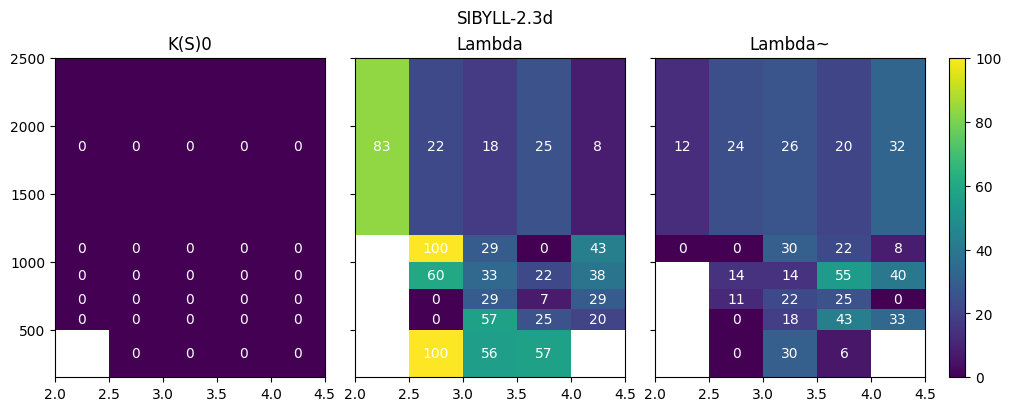
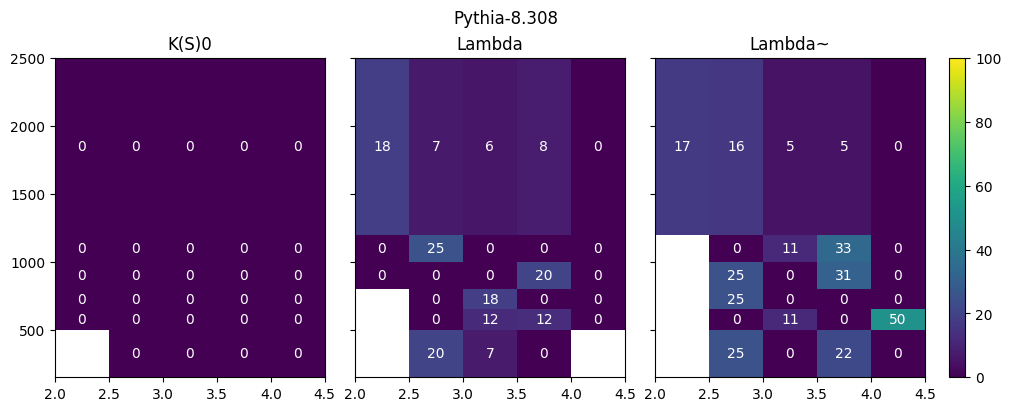
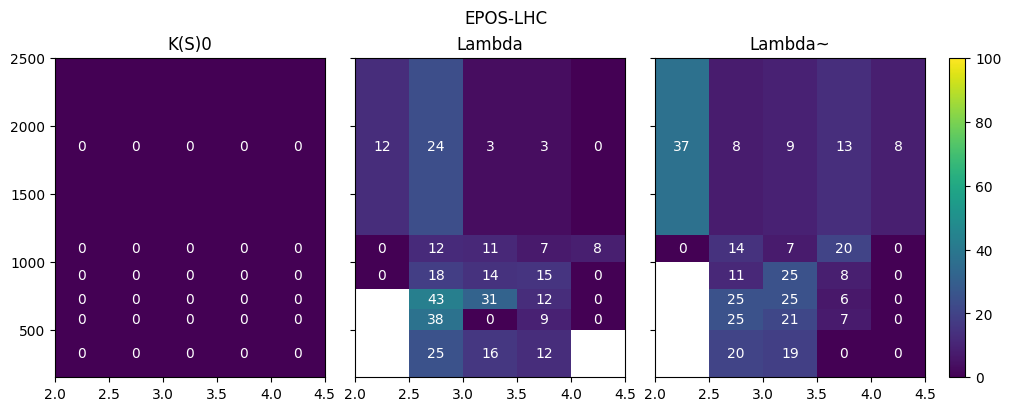
fig, ax = plt.subplots(1, 3, figsize=(10, 4),
sharex=True, sharey=True, layout="compressed")
for model, h in results.items():
for i, pid in enumerate(h.axes[2]):
plt.sca(ax[i])
plt.title(pdg2name(pid))
val = np.sum(h.values()[:, :, i, :], axis=(0, -1))
n_total = np.sum(val, axis=-1)
n_prompt = val[..., h.axes[3].index(0)]
feed_down_fraction = 1 - n_prompt / n_total
feed_down_fraction *= 100 # make percent
plt.stairs(feed_down_fraction, h.axes[1].edges, label=model)
plt.sca(ax[0])
plt.ylabel("non-prompt fraction in percent")
fig.supxlabel("$p_\mathrm{T}$ / MeV$c^{-1}$")
plt.legend();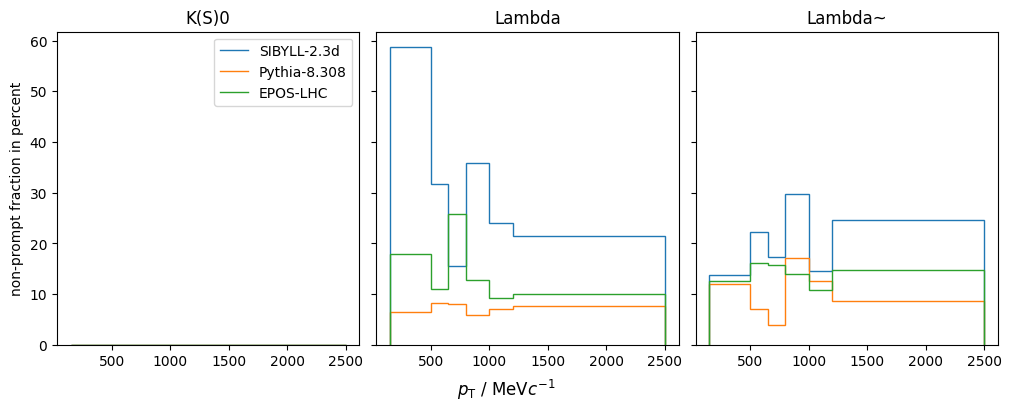
fig, ax = plt.subplots(1, 3, figsize=(10, 4),
sharex=True, sharey=True, layout="compressed")
for model, h in results.items():
for i, pid in enumerate(h.axes[2]):
plt.sca(ax[i])
plt.title(pdg2name(pid))
val = np.sum(h.values()[:, :, i, :], axis=(1, -1))
n_total = np.sum(val, axis=-1)
n_prompt = val[..., h.axes[3].index(0)]
feed_down_fraction = 1 - n_prompt / n_total
feed_down_fraction *= 100 # make percent
plt.stairs(feed_down_fraction, h.axes[0].edges, label=model)
plt.sca(ax[0])
plt.ylabel("non-prompt fraction in percent")
fig.supxlabel("$y$")
plt.legend();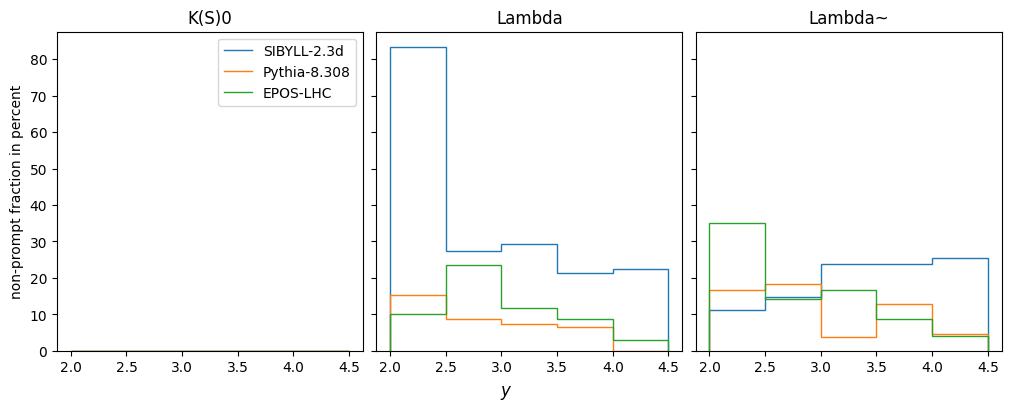
# look feed-down fraction as function of z cut: 0 < z < 2m
fig, ax = plt.subplots(1, 3, figsize=(10, 4),
sharex=True, sharey=True, layout="compressed")
for model, h in results.items():
for i, pid in enumerate(h.axes[2]):
plt.sca(ax[i])
plt.title(pdg2name(pid))
h2 = h[..., bh.rebin(10)]
val = np.sum(h2.values()[:, :, i, :], axis=(0, 1))
n_total = np.sum(val, axis=0)
n_prompt = val[h2.axes[3].index(0)]
feed_down_fraction = 1 - n_prompt / n_total
feed_down_fraction *= 100 # make percent
plt.stairs(feed_down_fraction, h2.axes[4].edges, label=model)
plt.sca(ax[0])
plt.ylabel("non-prompt fraction in percent")
fig.supxlabel("$y$")
plt.legend();/var/folders/tl/pv6mt7z17tz0stm1fjfg01cc0000gn/T/ipykernel_31759/729878470.py:14: RuntimeWarning: invalid value encountered in divide
feed_down_fraction = 1 - n_prompt / n_total